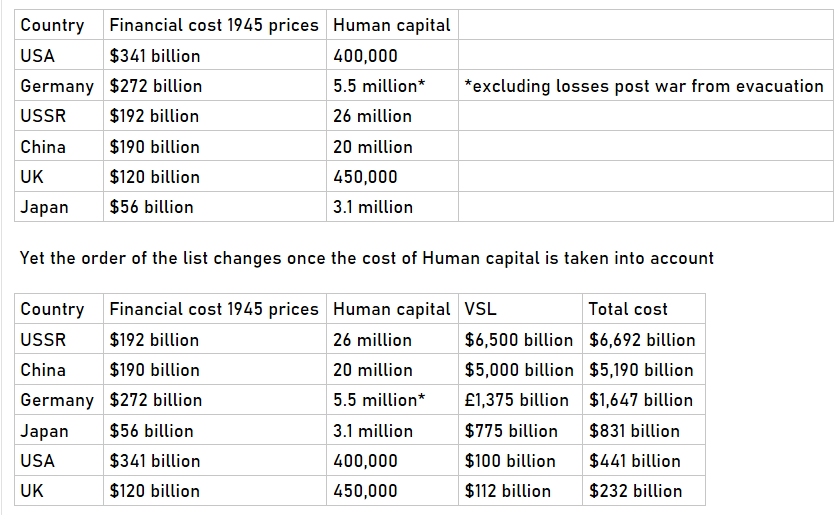It's an excellent article/post making points that I've been frustrated at not seeing in academic/popular reviews of O'Brien's generally insightful, well-written, and well-researched book.
O'Brien argues that, for all major WW2 combatants except Russia, air and sea production dominated war production. From that fact, he argues that the air-sea war - and especially the West's contributions to it - were the real decisive factors in the war, not the Eastern Front.
As I've said elsewhere, one seemingly obvious blindspot of the book's focus on war production is that economies produce at least two things: goods and services. viewtopic.php?f=11&t=248298#p2260332 Fielding armies - moving immense manpower resources from goods production to military services provision - implies an immense opportunity cost in goods production. O'Brien's focus on the air/sea battle's primacy in military goods production completely ignores the land war's primacy in military services.
Davies is on to this point, creating an interesting table of financial vs. human life costs, using "value of life" economics:

I want to amplify Davies point by looking at the effects of human capital distribution during the war, which complements the above graph of retrospective human capital "expenditure."
Just look at German manpower distribution in 1944. From DRZW vol.V, p.928:

As of mid-'44, Germany had called up 10.7mil men to the Wehrmacht and was employing ~20.3mil men in the domestic economy.
Of the Wehrmacht's 10.7mil, ~90% were committed to land war (Heer, Waffen-SS, LW ground units, LW activity apportioned to ground support) or were dead/disabled/missing due to land war. So ~30% of Germany's male population was providing military services in the land war or had died/etc. doing so. [The DRZW table might understate Wehrmacht recruitment, as Germany had ~9.5mil soldiers in all branches in mid-44 and had already lost a few million].
Any familiarity with the fights between OKW/H and industry over soldiers vs. factory workers will tell you that returning those 30% of men to the factories would have massively increased German military production.
And it's not simply a matter of arithmetic proportion: The men serving in the Wehrmacht were younger, healthier, and often better-educated/skilled than those who stayed at home. In an industrial economy they were certain to have been more productive than extremely young, old, or infirm men. Despite the "Reserved occupation" label - always inefficient anyways - the Wehrmacht claimed a disproportionate share of Germany's technical and skilled human capital. See, e.g., DRZW vol.V "Distribution of Scarcity" p. 1114-1147.
If we suppose that the Wehrmacht devoted to land war 40% of Germany's productivity-adjusted male manpower in 1944, thereby removing it from war production, and add this factor to the land war's ~45% share of industrial production, then the economic resources of Germany were overwhelmingly concentrated on land warfare.
Applying this analysis to other countries likewise demonstrates the incompleteness of O'Brien's central thesis.
The Soviet Union had ~31mil non-agricultural workers in 1942, of whom 10.9mil were in the military. The Soviet Home Front 1941-45, Harrison, p.215. The SU had already lost ~5mil to the Germans on land so about 15mil of ~36mil non-agricultural workers were devoted to the land war military services under this accounting. As with Germany, soldiers were generally younger and healthier than those left in the factories so it was probably the case that half of Soviet (male and productivity-adjusted) manpower was providing military services to the land war in 1942. Certainly later in the war, as the tally of the land war's dead/disabled/missing increased, 50% would be an underestimate. As even O'Brien recognizes that Soviet goods production was majority land-focused, a good accounting of Soviet goods+services potential devoted to land war would certainly exceed 80%.
For the Western Allies and Japan my analysis amends O'Brien's picture significantly less, as these countries threw far less of their productive capacity into military services and, of these military services, a far greater proportion went to manning/maintaining/supplying ships and planes. Nonetheless, the land forces of the US and Britain always exceeded the other services in manpower allotment and consideration of their productive capacity for goods instead of military services (i.e. production opportunity cost of armies) would shift the balance land-ward from the low-20's percentages figured by O'Brien.